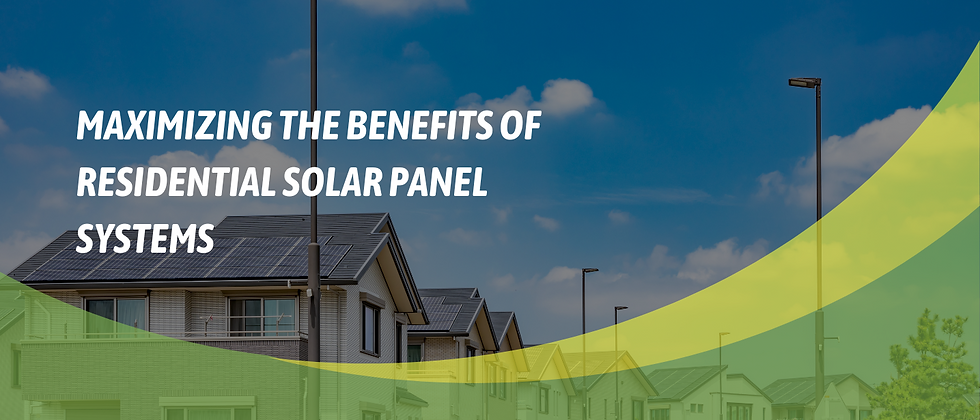Maximizing the Benefits of Residential Solar Panel Systems
- info5347849
- Apr 26, 2024
- 2 min read
Updated: May 15, 2024

In our most recent blog article, we explore how homeowners may use to optimize the benefits of residential solar panel installations. Here's a synopsis of the main points.
1. Optimal Placement:
Install solar panels in places with the most excellent daily sunshine exposure. This involves typically orienting them south in the Northern Hemisphere and north in the Southern Hemisphere.
2. Efficient System Sizing:
Determine the optimal solar panel system size depending on your household's energy use. Oversizing can incur extra costs, while undersizing may not meet your energy requirements.
3. Use Energy Storage:
Invest in batteries to store surplus energy created throughout the day and use it during peak hours during power disruptions. This helps to increase self-consumption while reducing dependency on the grid.
4. Net Metering:
Utility providers offer net metering rules, allowing homeowners to return excess power to the grid. This can reduce energy expenditures while also providing additional revenue.
5. Energy-Efficient Appliances:
Combine solar panel systems with energy-efficient appliances to minimize energy use while increasing the amount of solar energy generated.
6. Regular Maintenance:
Keep solar panels clean and well-maintained for best performance. Regular inspections can detect problems early on and minimize possible losses in energy generation.
7. Energy Monitoring Systems:
Set up monitoring devices to track energy output and consumption in real-time. This data can assist in optimizing consumption patterns and suggest opportunities for additional efficiency improvements.
8. Government Incentives:
Take advantage of the government incentives, tax credits, and rebates available for solar panel installation. These can drastically cut upfront expenditures while increasing the return on investment.
9. Educate Yourself:
Stay current on advances in solar technology, regulatory changes, and best practices for optimizing the advantages of household solar panel installations. Continuous learning allows you to make more informed judgments and adapt to changing conditions.
Implementing these tactics allows homeowners to optimize residential solar panel installations' financial, environmental, and energy independence benefits.
Conclusion:
In conclusion, residential solar panel systems offer numerous benefits for homeowners, ranging from reduced electricity bills to environmental sustainability. By implementing the strategies outlined in this blog post, homeowners can maximize these benefits and optimize the performance of their solar energy systems.
From optimal placement and efficient system sizing to energy storage and net metering, there are various ways to enhance the effectiveness of residential solar panel systems. Additionally, pairing solar panels with energy-efficient appliances, maintaining them regularly, and utilizing energy monitoring systems can increase efficiency and savings.
Moreover, taking advantage of government incentives and staying informed about advancements in solar technology ensure that homeowners make the most of their investment in solar energy.
By following these principles and continuing to educate themselves on best practices, homeowners may reap the financial, environmental, and energy independence advantages of residential solar panel systems for years to come. Together, we can help to create a cleaner, more sustainable future while enjoying the benefits of renewable energy.



Comments